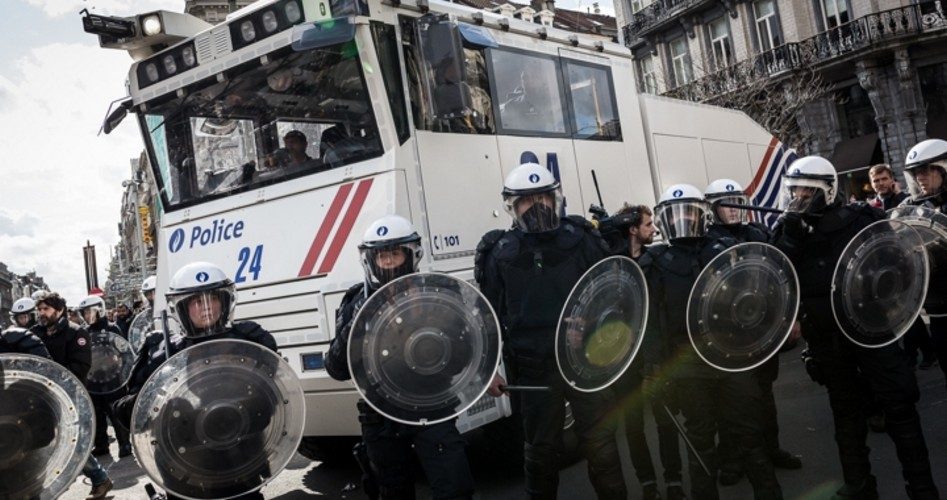
Raids carried out by Belgian authorities to detect and apprehend members of the terrorist organization responsible for the bombings that killed 34 people in Brussels on March 22 have uncovered what is being described as “alarming” evidence of a Europe-wide jihadist cell connected to the attacks.
A joint report from CBS and AP said that heavily armed police swept through Brussels’ Schaerbeek neighborhood and the Brussels-Capital Region’s Forest and Saint-Gilles districts on March 25, following the sound of “two big explosions” in Schaerbeek.
During the raids, police saw a man holding a bag sitting alongside a young woman and ordered him “to put the bag far from him,” Norman Kabir, a local electrician told the AP. Kabir said the woman was taken into safe custody, and the bomb squad used a robot to search the bag.
The report also quoted another witness to the incident who said: “They told [the suspect] to stop. He tried to do something and boom, boom, two shots.”
The CBS/AP report said that the Europe-wide jihadist cell uncovered in the raids was connected not only to the attacks in Belgium, but also those killing 130 people in Paris in November. The terrorist Islamic State (also referred to as ISIS or ISIL) has been identified as being responsible for all of these attacks.
As a result of the ongoing investigation, Belgian crime-lab technicians and police investigators found that DNA from one of the suicide bombers at the Brussels airport — identified as Najim Laachraoui, who was a suspected bomb-maker — was also found on a suicide vest and bomb used in last November’s Paris attacks.
The report also noted that the leading suspect in the Paris bombings, Salah Abdeslam, who was captured in Brussels last week, has stopped cooperating with police. Abdeslam “no longer wants to talk,” said Belgian Justice Minister Koen Geens. France is seeking his extradition.
We reported in a March 24 article that Abdeslam had been recruited into the terrorist network headed by Abdelhamid Abaaoud (the individual that French and Belgian officials suspected was the mastermind of the Paris attacks — and who was killed in a police raid in a Paris suburb on November 18). The two men were childhood friends while growing up in Brussels and were both of Moroccan descent. After Abaaoud returned to Brussels following a period of terrorist activity in Syria in 2014, he recruited Abdeslam into his terrorist network and both men conspired to carry out the Paris attacks.
Abdeslam fled Paris immediately after the November attacks, and moved back to the Molenbeek neighborhood of Brussels where he and Abaaoud had grown up. An AP report at the time cited Belgian officials who said that the neighborhood has long been known as a haven for jihadis. At least three of the terrorists who plotted the Paris attacks, including Brahim Abdeslam (Salah’s brother), and Abaaoud grew up and lived in Molenbeek.
A March 23 AP report quoted French Senator Nathalie Goulet, who is co-head of a commission tracking jihadi networks as saying, “Not only did [Abdeslam] drop out of sight, but he did so to organize another attack, with accomplices everywhere. With suicide belts. Two attacks organized just like in Paris.”
Goulet and other European officials have estimated that from 400 to 600 Islamic State fighters have trained specifically for external attacks.
As was noted in a report in The New American posted March 25, Hungarian Prime Minister Viktor Orban, speaking at Hungary’s National Museum on March 15 (just one week before the Brussels attacks) spoke about an entirely different threat to Europe emanating from Brussels — the policies established by European Union leaders to accept and distribute 120,000 migrants fleeing turmoil in the Middle East across Europe. We reported last September that EU leaders approved such a plan at an emergency EU summit held in Brussels on September 22.
Orban said at his speech delivered during commemorations of Hungary’s 1848 revolution against Austria’s Habsburgs that “the time has come to ring the alarm bells and gather allies” to reject the Brussels plan.
“If we want to stop the mass migration, first we must put the brakes on Brussels,” said the Hungarian leader.
Fox News reported that Orban strongly opposes taking in the Muslim refugees and is organizing a national referendum opposing any EU decision to resettle migrants among members states. Furthermore, Hungary is suing the EU at the European Court of Justice to avoid participating in the planned resettlement scheme.
Orban has equated migration with terrorism and has brought in tougher immigration and asylum rules that have been criticized by the UN refugee agency.
“It is forbidden to say that immigration brings crime and terror to our countries,” Orban said. “It is forbidden to say that the arriving masses from other cultures are a threat to our way of life, our culture, our habits and our Christian traditions.”
Though Orban’s speech was delivered before the terrorist bombings in Brussels, the subsequent link between the attacks in Brussels and Paris proved that his warnings had much merit. As we noted in an article in February, Hans-Georg Maaßen, the president of Germany’s domestic security agency (known as the Federal Office for the Protection of the Constitution — BfV) said on February 5 that his agency has received more than 100 warnings that Islamic State (ISIS) militants had entered his nation among refugees.
Back in October, Abdelhamid Abaaoud, the individual that French and Belgian officials regard as the mastermind behind the Paris attacks, falsely identified himself as “Ahmad al Muhammad” and was allowed to enter Greece among the waves of Syrian refugees flooding into Europe.
As for how many other potential terrorists have entered Europe disguised as refugees, no one is certain. What is certain is that Europe, as well as the United States, must become more vigilant about strengthening its borders and preventing these terrorists from entering its territory. Even if such a policy were to be implemented immediately, however, it may be too late to prevent further terrorist attacks.
Photo of Belgian police: AP Images
Related articles:
Hungarian PM: Mass Migration a Plot to Destroy Christian West
ISIS Has Trained 400 Fighters to Attack Europe
Brussels Terror Attacks Underscore Insanity of EU Migration Policy
Germany Does Not Know Where 130,000 Asylum Seekers Are
German Intelligence Says ISIS Fighters Are Among Refugees
Refugee Crisis Has Europe on the Brink, Establishment Admits
Anti-immigration AfD Party Makes Gains in German State Elections
U.S. European Commander: Risk of Terrorists Recruiting Refugees in Europe
After Migrant Numbers Reach Record Highs, EU Summit Aims to Stem Flow
Anti-ISIS Coalition Built ISIS (Video)
German Cabinet Official Warns Europe Can Expect 10 Million More Migrants
German Newspaper: Officials Are Covering Up Crimes by Migrants
Czech President Calls Influx of Refugees to Europe an “Organized Invasion”
European Parliament President Says “Christians Are Not Safe” in Europe
Hungary’s Orban Says Germany Made “Secret Pact” with Turkey to Accept Refugees
French President: Refugees Still Welcome, Despite Paris Attack
Refugee Crisis Prompts Sweden to Introduce Border Controls
In Response to Massive Influx of Refugees, Europeans Seek More Guns
EU Leaders Will Spread 120,000 Refugees Across Europe
Germany Changes Policy and Halts Massive Influx of Middle Eastern Refugees
Flood of Refugees From Syrian Civil War Challenges Europe
European Commission President Asks EU to Accept 160,000 Migrants


